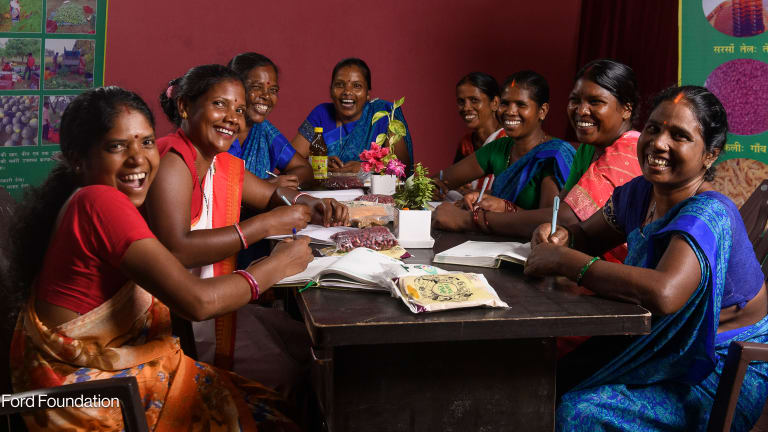
Deeply ingrained discrimination and gender-based inequalities are undermining economies, stability, growth, and rights for half the global population.
We live in a world where women make up almost 40% of the world’s labor force, according to the World Bank. When accounting for informal work, that figure rises to 75%. Furthermore, Oxfam claims that women work two-thirds of the world’s working hours, and produce the majority of the world’s food. And yet, most of the laws and systems are designed by, and for, men.
The COVID-19 pandemic has laid bare extreme and persistent gender-based inequalities — as well as those based on income, race, ethnicity, and so many other personal identifiers — and how they intersect to create significant vulnerabilities. For example, McKinsey & Company estimated female job loss rates due to COVID-19 is 1.8 times higher than that of males, and while women only take up 39% of global employment, they account for 54% of overall job losses. These issues, of course, are context-specific and compounded by other factors of discrimination such as race, caste, ethnicity, class, disability, and sexual identity, among others.
We actively support partners in … increasing women’s influence, power, and agency by dismantling the barriers historically holding them back.
—To promote women’s leadership and an intersectional feminist recovery, we need to address deep-seated systemic and institutional issues underlying COVID-19 and other crises. This will ensure the design of interventions that will transform systems, enabling them to deliver services and advance rights so that millions of people and historically disadvantaged constituencies can experience meaningful and sustained improvement to their lives.
How to address those issues
Over the past few months, Co-Impact — a global philanthropic collaborative for systems change, focused on improving the lives of millions of people around the world — has been running an open call for grant applications from social change leaders and organizations focused on advancing intersectional gender equality and women’s leadership in the global south.
We have received hundreds of proposals from organizations working across Africa, Asia, and Latin America. These locally-rooted groups — including women's rights organizations and feminist movements — have solutions and innovations that can fundamentally change how systems function to deliver better outcomes for millions of people.
This could come in the form of a think tank in Kenya, led by women economists, who are supporting chambers of commerce and the ministry of labor to improve child care services. Or from a women-led nonprofit in Brazil working with the ministry of health to train and empower female front-line health workers to focus on sexual and reproductive health.
But how do we get more funding to support these efforts, and deploy this funding in a way that gets to the roots of structural inequality?
These questions guide the development of Co-Impact's new Gender Fund, which aims to raise and deploy $1 billion over the next decade. Through this latest, as well as subsequent open calls, we will invest in initiatives that tackle the root sources of inequality: the systems that control resources and shape the lives of millions of people.
The following three core principles are the basis for the fund’s model:
1. Recognizing and addressing the systemic nature of gender inequality. Systems do not serve all people equitably. Girls and women everywhere face additional hurdles through discriminatory policies and harmful social norms. The impacts of climate change and COVID-19 have only exacerbated these challenges.
We actively support partners in changing policy environments, mobilizing and strategizing, increasing women’s influence, power, and agency by dismantling the barriers historically holding them back, and crucially strengthening their own organizations through dedicated resources for organizational strengthening rather than allocated to specific projects. This is so that health, education, and economic systems are able to produce equitable outcomes for millions of people. Women should not only benefit from but fundamentally shape these systems.
2. Supporting partners deeply rooted in the contexts they seek to change. Many of our program partners have been leading social change work for decades. They have the vision for transformation and the expertise, contextual knowledge, and relationships to make change happen. We seek to be supportive rather than directive. We address and acknowledge power dynamics and facilitate space for organizations to be flexible and responsive.
One example of this is around the question of measurement. We often hear how metrics are used by funders to determine if things are on track, when they should be based on what is useful to the partners. Given change doesn’t happen in a linear way, organizations often need to adapt their monitoring and evaluation approaches and so our donors also need to be flexible. We trust our partners to know what will work, and where things need to shift or evolve.
3. Funding in a way that goes beyond short-term, restricted grants. Funders are often too restrictive and short-term in their thinking, focusing on what's possible in one to two years. We support partners in reimagining and transforming systems so that they can be more inclusive and effective, and in challenging norms about women’s roles in society. That takes time. As a result, we offer significant, longer-term grants that range between $1 million to $20 million accompanied by deep nonfinancial support.
We know that the challenges are systemic and that the funding required needs to be proportionate to the needs. We recognize that there is no single, silver-bullet approach to systems change and solving gender inequalities, and that it takes the collective action of multiple, diverse actors.
Our goal is to significantly grow the funding for gender equality and women’s leadership by bringing together funders from around the world to provide the trust and long-term support needed to make real change. By pooling our resources, we are able to support some of the world’s most courageous and creative organizations to have greater impact and make the world a place where every person can live with dignity and thrive.
Learn more about Co-Impact's Gender Fund. Applications are open until Dec. 20.








